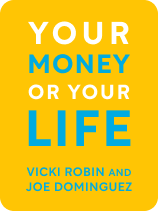

This article is an excerpt from the Shortform book guide to "Your Money or Your Life" by Vicki Robin and Joe Dominguez. Shortform has the world's best summaries and analyses of books you should be reading.
Like this article? Sign up for a free trial here .
Do you need some direction to find your life purpose? Do you need help to clarify your values and discover your dreams?
In Your Money or Your Life, Vicki Robin and Joe Dominguez explore purpose, values, and dreams in the context of money. When you find your life purpose, identify your values, and clarify your dreams, it’s easier to align your spending with what you want in life.
Keep reading to learn how to find your life purpose, values, and dreams.
Clarify What You Want in Life
Part of understanding how you spend your life’s energy is to look at the things—material and immaterial—that you want in life. First, you have to get in touch with what you are trying to achieve in life. You start by finding your life purpose, identifying your values, and rediscovering your dreams.
We’ll explore some questions to help you define each of these things for yourself.
Find Your Life Purpose
Finding your life purpose can guide your spending habits and how you use your time.
There are two kinds of purpose:
- Your general purpose is more short-term and personal. It’s when you act or do something in the present that allows you to achieve something important later. For example, you save money now so that you can take a sustainable farming course later.
- Life purpose is more long-term and focused on the bigger picture—how you choose to put your life energy to use to contribute to the world. It’s recognizing that you are a small part of a bigger whole, but instead of feeling insignificant, you’re empowered to contribute your talents to important causes.
If our purpose in life is out of focus, we amble along with little direction. Identifying your purpose allows you to align your life’s energy with it.
The 3 Steps to Find Your Life’s Purpose
Ecologist and writer Joanna Macy suggests three approaches for finding your life’s purpose:
- Identify your passion. Think about a cause or activity that you’d dedicate yourself to, not to escape or avoid your life, but because you care about it. Maybe you’re a skilled kayaker and you decide to lead guided kayaking tours of your favorite local lake.
- Identify your pain. If you’ve navigated a tough experience, you may have expertise to help others in similar situations. For example, if a close friend of yours committed suicide, you could dedicate part of your time to suicide prevention organizations.
- Identify problems close by. There may be problems in your community that you feel called to make better. For example, you start writing regular letters to get your city council to allocate money to homeless services.
Identify Your Values
Your values reflect your beliefs. We feel content when our behavior is consistent with our values. But how we choose to spend our time and life energy doesn’t always reflect our true values. Sometimes we need to adjust how we spend our time and/or money.
For example, maybe you value reducing your carbon emissions to combat global warming. You’d like to express that value by commuting by bike, but instead, you justify driving your car to work most days because the bike commute adds an extra 20 minutes of travel. To solve this, you elect to prep your lunch and work bag at night to reclaim 20 minutes of your morning, allowing you to bike.
Rediscover Your Dreams
Another way to get in touch with your sense of purpose is to revisit childhood dreams. These dreams can indicate how we’d enjoy spending our time.
But sometimes, we abandon our dreams. There are two main reasons:
- We dismiss dreams as too childish, thinking they will never come true. Trying to get your painting career off the ground might be difficult if your current desk job takes up all of your time, and you have bills to pay. More often than not, you might just stick with work you don’t like, as discussed in Step 1.
- We take on debt, and dreams start to feel impossible. Sometimes achieving a dream involves going into debt, as in getting a college education. This debt limits our ability to achieve additional dreams—we can’t afford to pursue them.
To find fulfillment, we have to reclaim our dreams and take steps to achieving them while dealing with our other obligations, like debts or bills.
At first, it might feel difficult to access and work toward dreams that you’ve set aside for so long. Answer the questions below to remember your dreams:
- When you were a kid, what did you picture yourself doing for work?
- What is something you’ve done—in your career, or in general—that you’re proud of?
- What is something that you’ve wanted to do for a long time, but haven’t yet?
- What makes you feel fulfilled? How does it relate to money?
- You learn you have one year, max, left to live. What would you choose to do with that time?
- If you could live without having to work for money, how would you spend your time?
When you find your life purpose, values, and dreams, you clarify what you want in life and better understanding how you should spend your life’s energy.

———End of Preview———
Like what you just read? Read the rest of the world's best book summary and analysis of Vicki Robin and Joe Dominguez's "Your Money or Your Life" at Shortform .
Here's what you'll find in our full Your Money or Your Life summary :
- The 9 steps to reach financial independence
- How to change your entire relationship with money and live a more meaningful life
- How to align your spending habits with your values, purpose, and dreams






